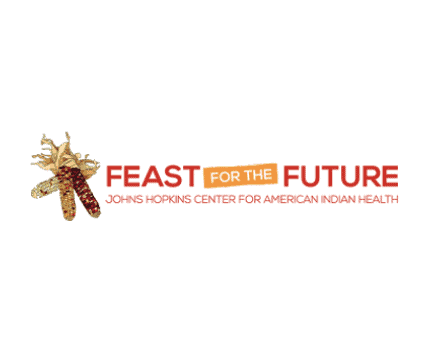About
What is Feast for the Future?
Feast for the Future is a model program that promotes Native communities’ capacity to strengthen local food systems through the power of their traditions. The Feast for the Future (FFF) Program is an innovative and holistic program that ensures American Indian children and communities have access to healthy and nutritious foods. FFF promotes Native communities’ capacity to reintroduce indigenous foods and agriculture and supports access to healthy and nutritious foods for children and community members.
This community-envisioned program aims to promote:
- The reintroduction of healthy indigenous foods, diets, agriculture, and meal preparation;
- Nutrition education;
- Healthy food access; and
- Intergenerational knowledge sharing.
Why was Feast for the Future developed?
All Native American children and their families deserve to be healthy, connected to their cultures, and free of obesity and diabetes. The Feast for the Future program was created in response to the participating communities’ concerns for the health of their people, and an interest in strengthening local food systems through the power of traditions. Having developed this unique, holistic, and evaluated program, our goal is to empower communities by providing tools to revitalize their traditional foodways and improve their health through structured, sustainable program components.
Access to safe, nutritious, and affordable foods is a basic human right that many indigenous communities are not granted. Many barriers include, but are not limited to: geographic location, the food aid system, and the forced loss of traditional foods and food preparation. The barriers to food access and the removal of cultural and traditional food cultivation and preparation have contributed to food insecurity, malnutrition, and an increased prevalence of food-related illnesses in AI/AN communities.
It was designed and implemented by the Johns Hopkins Center for American Indian Health in partnership with the Santo Domingo Pueblo, the Tuba City community on the Navajo (Diné) Nation, and the White Mountain Apache Tribe.
How Communities Benefit
The Feast for the Future program connects elders, youth, and other community members, pass on traditional food system knowledge, and support our next generations to be healthy. Our vision is to disseminate FFF widely to enable as many tribal communities as possible to tailor FFF to their needs by using the online program guides on this website to create sustainable programming in their own communities. It is an honor and a privilege to share this comprehensive program with interested communities.
PROGRAM SPECIFICS
The overarching goal of the Feast for the Future Program is to reduce the burden of obesity and obesity-related diseases among American Indian families.
Our strategic objectives are to:
- Increase gardening and nutrition knowledge, attitudes, and practices;
- Increase sustainable practice of traditional farming and capacity building; and
- Increase access and availability of healthy foods.
This video provides insight into how Feast for the Future impacted a participating community:
All program activities are guided by a Community Advisory Board in each participating community. Each Board meets on a monthly to quarterly basis depending on the site to review program activities and provide direction and guidance on all Feast for the Future components.
Based on the program aims, Feast for the Future developed and rigorously evaluated six program components:
Edible School Garden Program
A school-based program that teaches 3rd-5th graders the fundamentals of nutrition and gardening/farming, and meets the Common Core Standards set by the states of New Mexico and Arizona in Math, Reading, Science, Language Arts, and Social Studies.
Traditional Foodways Education Program
A program focused on traditional foodways that is primarily taught by elders and farmers in the community to youth aged 5-18, and emphasizes traditional language instruction.
Community Gardens, Orchards, and Greenhouses
Community-appropriate places to develop traditional agricultural foodways, including gardens, orchards and greenhouses that are maintained in collaboration with local partners.
Farmers Markets
Farmers markets developed, implemented, and sustained to increase access to local healthy foods for the community, and contribute to local farmers.
Farmers Workshops
A series of regular (monthly or quarterly) farmers workshops designed to build and share capacity for local farmers to efficiently produce healthy, fresh foods by sharing traditional and contemporary wisdom.
Family Gardens
Individual families and households develop home gardens to improve access to local, fresh foods.
You can develop your own Feast for the Future program!
The comprehensive implementation guide linked here provides an overview of the entire program and an explanation of each program component. This will help you decide if the FFF program is right for your community, and which components would benefit your community members.
If you are interested in learning more and gaining access to additional program resources, please contact feastforthefuture@jhu.edu
We would like to express our appreciation to the many people and organizations who contributed to the development of the Feast for the Future program. We are deeply grateful to our partnering communities that helped develop this unique program. Their input, guidance, wisdom, and spirit led the evolution of this program. With the generosity of our dedicated partners and the privilege of using a community-driven approach, we were able to help participating communities envision, develop, implement, and evaluate their own Feast for the Future program.
FUNDERS
This project has been supported by the W.K. Kellogg Foundation, Christensen Fund, Walmart Foundation, Schnieders Family Foundation, McCune Foundation, Newman’s Own Foundation, and The Kleins Family.
Contact Information: For more information and program resources please contact feastforthefuture@jhu.edu or 505-797-3305.

